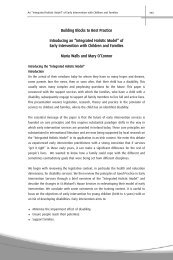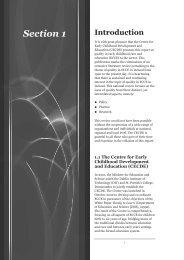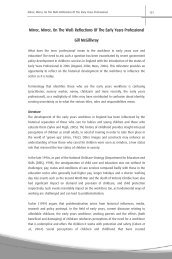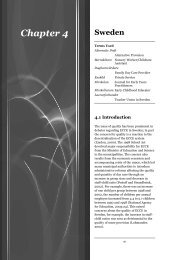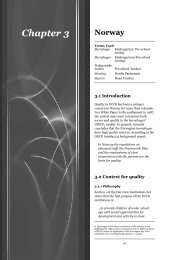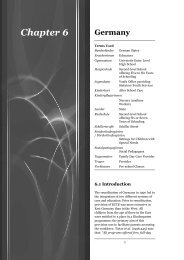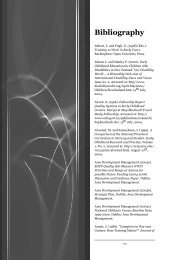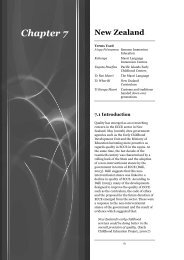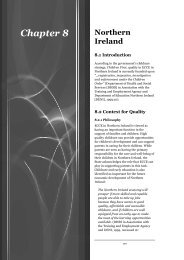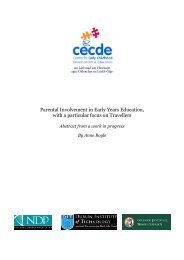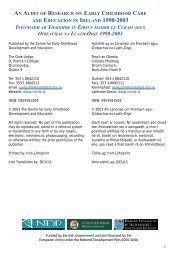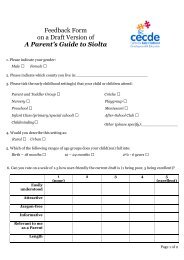Policy Developments 1990-2004 - Centre for Early Childhood ...
Policy Developments 1990-2004 - Centre for Early Childhood ...
Policy Developments 1990-2004 - Centre for Early Childhood ...
Create successful ePaper yourself
Turn your PDF publications into a flip-book with our unique Google optimized e-Paper software.
Section 4<strong>Policy</strong> <strong>Developments</strong> <strong>1990</strong>-<strong>2004</strong>Implications <strong>for</strong> the National Framework <strong>for</strong> Quality -DESDefining Quality:1. Quality is a difficult concept to define and is viewed by stakeholders in the systemfrom a variety of perspectives. This diversity of perspectives is seen as a positiveaspect of the ECCE sector and should be supported.2. There can be no one single definition of quality; rather a set of core criteria should beidentified, which settings can work towards attaining.3. The suitability and flexibility of the curriculum or programme in place is animportant characteristic of quality.4. The quality of the service provided impacts upon the nature and duration of thebenefits to the child.5. The quality of the personnel working in early years settings impacts significantly onthe quality of the services provided.6. Effective management and leadership structures must be in place to ensure thesetting per<strong>for</strong>ms to its maximum potential.7. Parental and community involvement and the establishment of positive home schoollinks are a key characteristic <strong>for</strong> quality.8. It is imperative to acknowledge the evolving and dynamic nature of quality in settingsto ensure that quality remains attainable in the contemporary context.9. Definitions of quality must include Input, Process and Outcome elements such aschild indicators, staff indicators, physical environment indicators, social indicatorsand natural indicators.10. Adult-child interactions are seen as being an integral characteristic to high qualityservices.11. Quality must be regarded as a continuum with a number of reference points that canbe worked towards either individually or collectively.12. The provision of an intercultural curriculum is seen as an important support <strong>for</strong> theeducation of Traveller children.13. Curricular guidelines must be flexible to accommodate the capacities and dispositionsof all pupils, including those with special needs.Assessing Quality:1. Careful inspection and evaluation of settings are a key element to ensuring thatquality is achieved and maintained. Such evaluation should incorporate widereducational stakeholders, including parents, teachers and management.2. Assessment must include both self-assessment within settings and externalinspection to ensure quality is achieved.3. Legislation underpinning the assessment of the education system af<strong>for</strong>ds a statutorybasis to the evaluation of the system as a whole.4. The proposed QE mark should assess all aspects of the ECCE setting, includinghealth and safety and also educational elements within a single inspectionframework.31



